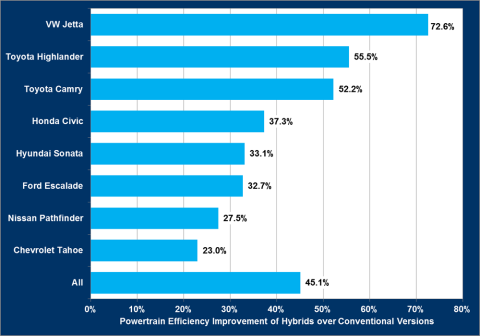SUBSCRIBE to the Fact of the Week
Powertrain efficiency in a recent study was defined as the ratio of tractive work (integrated power) needed for a vehicle to complete a drive cycle divided by the fuel energy consumed. In short, this is a measure of how good the powertrain is at getting fuel energy to the road. Many cars have a fuel economy advantage over light trucks due to weight and aerodynamics, but there is not a lot of difference in the powertrain efficiencies by vehicle class. There is a difference, however, in the powertrain efficiency between a hybrid vehicle and its conventional counterpart.
The study compared powertrain efficiency for eight pairs of same-model vehicles for MY2013; the values for powertrain efficiency for conventional vehicles were compared to their hybrid counterparts using data from the Environmental Protection Agency’s Office of Transportation and Air Quality. Of the vehicles in the study, the VW Jetta showed the greatest difference between the conventional and hybrid powertrains with the hybrid showing 72.6% improvement. All hybrids in the study had an average efficiency gain of 45.1% over their conventional counterparts. Models that show less improvement with a hybrid powertrain may reflect a more efficient conventional powertrain so caution should be used in comparing the models listed. It is also worth noting that even more modest efficiency improvements for larger vehicles, such as the Chevrolet Tahoe, can have a great impact on overall fuel consumption.
Powertrain Efficiency Improvement for Selected Hybrid vs. Conventional 2013 Counterparts
Supporting Information
| Make and Model | Improvement in Powertrain Efficiency |
|---|---|
| VW Jetta | 72.6% |
| Toyota Highlander | 55.5% |
| Toyota Camry | 52.2% |
| Honda Civic | 37.3% |
| Hyundai Sonata | 33.1% |
| Ford Escalade | 32.7% |
| Nissan Pathfinder | 27.5% |
| Chevrolet Tahoe | 23.0% |
| All | 45.1% |
Note: The hybrid Nissan Pathfinder was a 2014 model. | |


